Remington Premier Bismuth Waterfowl 16 Gauge 2.75" #4 1.12 oz – 25rds – R20511 For Sale
$53.99
The Remington Premier Bismuth Waterfowl 16 Gauge 2.75″ #4 1.12 oz – 25rds (model R20511) is a highly effective choice for hunters looking for superior long-distance performance. Utilizing denser HEVI bismuth shot, it outperforms traditional steel by maintaining extended flight and energy, ensuring lethal effectiveness at greater ranges. Its increased density allows for smaller shot sizes, resulting in a higher pellet count per payload, improving on-target accuracy and enhancing the chances of reaching bag limits during hunts. Suitable for both upland game and waterfowl across diverse terrains, this premium-grade ammunition offers hunters excellent performance at a budget-friendly price.
Can you shoot bismuth at waterfowl?
Yes, you can use bismuth-based shot for hunting waterfowl. Bismuth is considered a non-toxic alternative to lead shot and is approved for use in waterfowl hunting in many regions. Always make sure to follow local regulations and guidelines regarding ammunition types allowed for hunting.
Why are bismuth cartridges so expensive?
Bismuth cartridges are expensive primarily due to several factors:
1. **Material Cost**: Bismuth is a relatively rare metal, and its extraction and refinement processes are costly. This rarity and the expenses involved in sourcing bismuth contribute significantly to the price of the cartridges.
2. **Manufacturing Process**: Producing bismuth cartridges requires specialized manufacturing techniques that can handle the unique properties of bismuth. This often involves more intricate and costly production processes compared to more common materials like lead.
3. **Performance and Benefits**: Bismuth cartridges provide superior performance, especially in terms of being non-toxic and environmentally friendly. They are often used as an alternative to lead due to their similar density, making them suitable for waterfowl hunting where lead is prohibited.
4. **Demand and Niche Market**: The demand for bismuth cartridges is relatively niche, catering primarily to hunters who need non-toxic alternatives. This smaller market can lead to less economy of scale, contributing to higher prices.
5. **Import and Regulation Costs**: Many regions have regulations and tariffs affecting the import and export of raw bismuth, adding extra costs that are passed onto the consumer.
All these factors together result in bismuth cartridges being more expensive than those made from more common materials.
Is bismuth better than lead?
The comparison between bismuth and lead depends on the context in which you are evaluating them:
1. **Toxicity**: Bismuth is significantly less toxic than lead. Lead is well-known for its harmful effects on human health and the environment, while bismuth is considered one of the least toxic heavy metals.
2. **Applications**: Bismuth is often used in medical and cosmetic products due to its low toxicity, as well as in metal alloys and as a substitute for lead in certain applications, like fishing sinkers and ammunition. Lead, traditionally used in batteries, radiation shielding, and cable sheathing, is being replaced by safer alternatives like bismith when possible.
3. **Physical Properties**: Lead is denser and more malleable than bismuth. However, bismuth has unique properties, such as a high electrical resistance and a low melting point, which can be advantageous for specific applications.
4. **Environmental Impact**: Due to its lower toxicity, bismuth is considered more environmentally friendly compared to lead.
In summary, if the priority is on health and environmental safety, bismuth is generally considered better than lead. However, the specific attributes required for an application might make one more suitable than the other.
Is TSS better than bismuth?
Determining whether TSS (Tungsten Super Shot) is better than bismuth depends on the context and what you’re comparing—such as their uses in hunting, fishing, or other applications.
1. **Density and Performance:**
– **TSS**: Known for its very high density (around 18 g/cm³), TSS is often considered superior for applications like hunting because it delivers greater kinetic energy and deeper penetration compared to other materials. This makes it highly effective for long-range shooting.
– **Bismuth**: With a density of about 9.6 g/cm³, bismuth is denser than steel but less dense than TSS. It offers good performance for hunting but does not match the energy and penetration capabilities of TSS.
2. **Cost:**
– TSS is generally more expensive than bismuth. If budget is a concern, bismuth can be a more cost-effective option.
3. **Environmental Impact:**
– Both TSS and bismuth are non-toxic alternatives to lead, making them environmentally friendly choices. However, tungsten is more abundant and widely recycled, which can be seen as an advantage.
4. **Durability and Use:**
– TSS is extremely hard and durable, providing consistent performance even in adverse conditions.
– Bismuth is softer, which may result in slightly less consistent performance compared to TSS.
Overall, if performance and range are the primary considerations, TSS might be the better choice, whereas if budget and sufficient performance are more critical, bismuth could be preferred. The specific circumstances and requirements of your application are essential in making this decision.
Can I shoot bismuth through a full choke?
Yes, you can shoot bismuth through a full choke. Bismuth is a softer metal compared to steel, making it less likely to cause damage to the bore or the choke. It’s generally considered safe for use in older shotguns with fixed full chokes as well. However, it’s always a good idea to check the manufacturer’s recommendations for both the shotgun and ammunition to ensure safety and optimal performance.
What is the only legal gun that can be used to take waterfowl?
The only legal gun that can be used to take waterfowl is a shotgun. According to federal regulations in the United States, the shotgun must be no larger than 10-gauge, and it must be capable of holding no more than three shells, including the one in the chamber, unless it is plugged with a one-piece filler that cannot be removed without disassembling the gun.
Can you shoot bismuth in old shotguns?
Yes, you can generally shoot bismuth in old shotguns. Bismuth is softer and less dense than steel, making it a safer alternative for vintage firearms that might be damaged by harder steel shot. However, it’s always important to have the shotgun inspected by a qualified gunsmith to ensure it’s in good condition and to verify that the specific bismuth load is appropriate for your firearm.
How much does a pound of bismuth cost?
As of the most recent data, the price of bismuth typically ranges from $4 to $10 per pound. However, prices can fluctuate based on market conditions, supply and demand, and other economic factors. It’s a good idea to check a reliable commodities market source or supplier for the most current pricing.
What size bismuth shot for geese?
For hunting geese, bismuth shot sizes from BB to 2 are commonly recommended. These sizes provide a good combination of density and impact needed to effectively take down geese while ensuring compliance with non-toxic shot regulations. Always check local hunting regulations for specific requirements and guidelines.
Can you mix lead and bismuth?
Yes, lead and bismuth can be mixed together. They can form alloys, which are mixtures of metals. Lead-bismuth alloys are often used in various applications, such as in low-melting-point solders and in some nuclear reactors as coolant due to their good thermal conductivity and lower melting points compared to pure lead. However, it’s important to handle these metals safely, especially lead, due to its toxicity.
What size shot of bismuth to lead?
The size of bismuth shot compared to lead shot generally depends on what you are using it for, such as hunting or target shooting. Bismuth is less dense than lead, so typically, when transitioning from lead to bismuth, you might choose a bismuth shot one size larger to achieve similar performance. For example, if you typically use a #5 lead shot, you might use a #4 bismuth shot. Always consider specific manufacturer recommendations and local regulations when making this transition.
What is a cheap alternative to lead shot?
A cheap alternative to lead shot is steel shot. It is widely used in hunting and shooting sports as a non-toxic replacement for lead. Steel shot is generally more affordable and better for the environment and wildlife, reducing the risk of lead poisoning.
Can you shoot bismuth through Carlson choke tubes?
Yes, you can shoot bismuth through Carlson choke tubes. Bismuth is softer than steel, and Carlson choke tubes are designed to handle such non-toxic shot materials. However, it’s always a good idea to consult the manufacturer’s guidelines or contact them directly to ensure compatibility with your specific model of choke tube.
Is bismuth shot safe in old shotguns?
Using bismuth shot in old shotguns is generally considered safer than using steel shot. Bismuth is softer and more similar to traditional lead shot in terms of density and malleability, which reduces the risk of damaging the barrels of older shotguns that were not designed for use with harder materials. However, it is always important to check with the manufacturer or a qualified gunsmith to ensure that your specific shotgun is suitable for use with bismuth shot. Different guns may have varying tolerances, and it is crucial to ensure compatibility to maintain safety and preserve the firearm.
What type of shot is illegal when hunting waterfowl in the US?
The use of lead shot is illegal when hunting waterfowl in the United States. Hunters are required to use non-toxic shot, such as steel, bismuth, or tungsten, to prevent lead poisoning in waterfowl and other wildlife.
Be the first to review “Remington Premier Bismuth Waterfowl 16 Gauge 2.75" #4 1.12 oz – 25rds – R20511” Cancel reply
Related products
Remington Premier Bismuth Waterfowl
Remington Premier Bismuth Waterfowl 12 Gauge 2.75" #5 1.25 oz – 25rds – R20505
Remington Premier Bismuth Waterfowl
Remington Premier Bismuth Waterfowl 12 Gauge 3" #5 1.37 oz – 25rds – R20501
Remington Premier Bismuth Waterfowl
Remington Premier Bismuth Waterfowl 20 Gauge 3" #5 1.25 oz – 25rds – R20508
Remington Premier Bismuth Waterfowl
Remington Premier Bismuth Waterfowl 20 Gauge 2.75" #5 0.87 oz – 25rds – R20509
Remington Premier Bismuth Waterfowl
Remington Premier Bismuth Waterfowl .410 Gauge 3" #4 0.56 oz – 25rds – R20514
Remington Premier Bismuth Waterfowl
Remington Premier Bismuth Waterfowl 12 Gauge 3" #2 1.37 oz – 25rds – R20500
Remington Premier Bismuth Waterfowl
Remington Premier Bismuth Waterfowl 12 Gauge 2.75" #2 1.25 oz – 25rds – R20503
Remington Premier Bismuth Waterfowl
Remington Premier Bismuth Waterfowl 28 Gauge 2.75" #4 0.87 oz – 25rds – R20513
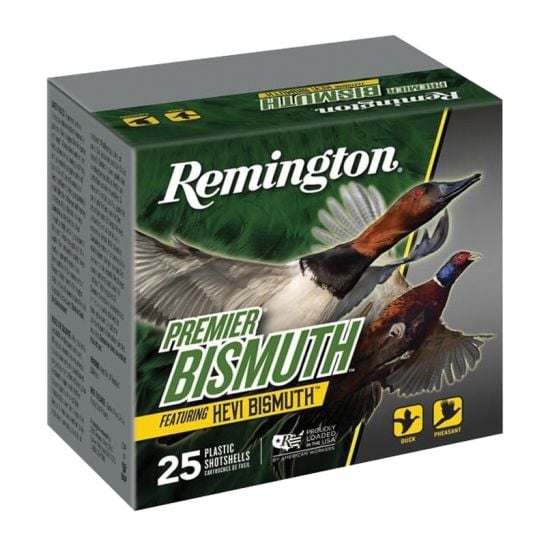
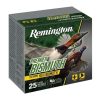
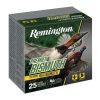
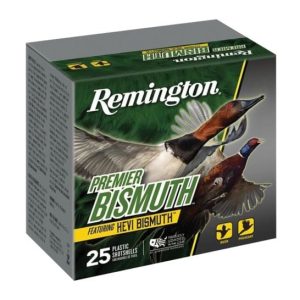
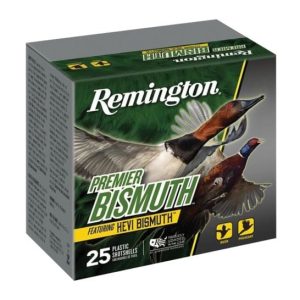
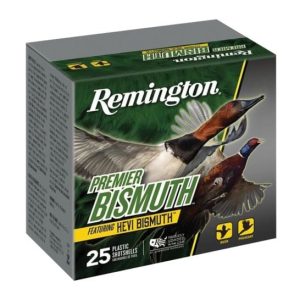
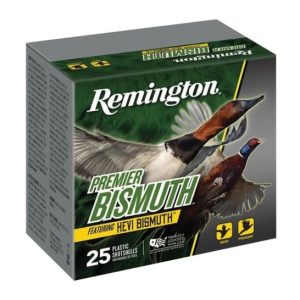
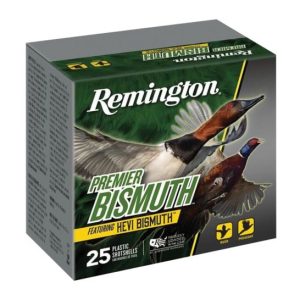
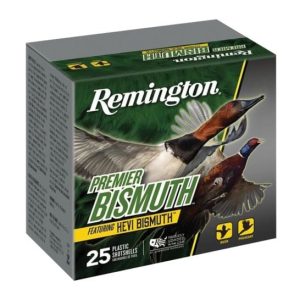
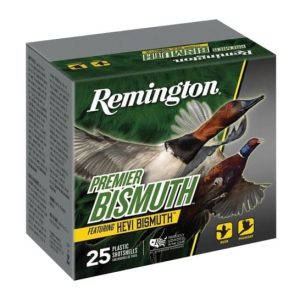
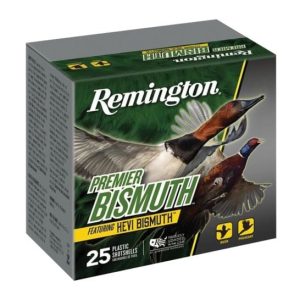
Reviews
There are no reviews yet.